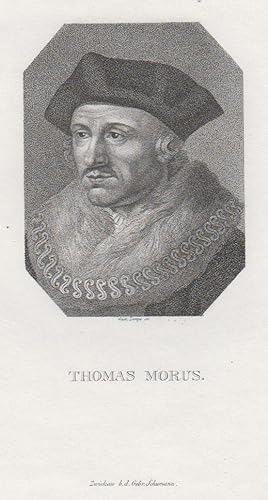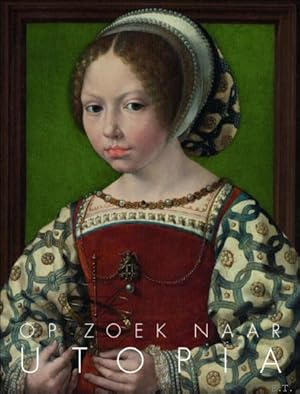more utopia 1516 (51 Ergebnisse)
Produktart
- Alle Produktarten
- Bücher (50)
- Magazine & Zeitschriften
- Comics
- Noten
- Kunst, Grafik & Poster (1)
- Fotografien
- Karten
-
Manuskripte &
Papierantiquitäten
Zustand
Einband
Weitere Eigenschaften
Land des Verkäufers
Verkäuferbewertung
-
Three Early Modern Utopias Thomas More: Utopia / Francis Bacon: New Atlantis / Henry Neville: The Isle of Pines (Oxford World's Classics)
Verlag: Oxford University Press, United Kingdom, Oxford, 2008
ISBN 10: 0199537992ISBN 13: 9780199537990
Anbieter: WorldofBooks, Goring-By-Sea, WS, Vereinigtes Königreich
Buch
Paperback. Zustand: Very Good. Thomas More: Utopia/ Francis Bacon: New Atlantis/Henry Neville: The Isle of Pines With the publication of Utopia (1516), Thomas More introduced into the English language not only a new word, but a new way of thinking about the gulf between what ought to be and what is. His Utopia is at once a scathing analysis of the shortcomings of his own society, a realistic suggestion for an alternative mode of social organization, and a satire on unrealistic idealism. Enormously influential, it remains a challenging as well as a playful text. This edition reprints Ralph Robinson's 1556 translation from More's original Latin together with letters and illustrations that accompanied early editions of Utopia. Utopia was only one of many early modern treatments of other worlds. This edition also includes two other, hitherto less accessible, utopian narratives. New Atlantis (1627) offers a fictional illustration of Francis Bacon's visionary ideal of the role that science should play in the modern society. Henry Neville's The Isle of Pines (1668), a precursor of Defoe's Robinson Crusoe, engages with some of the sexual, racial, and colonialist anxieties of the end of the early modern period. Together these texts illustrate the diversity of the early modern utopian imagination, as well as the different purposes to which it could be put. ABOUT THE SERIES: For over 100 years Oxford World's Classics has made available the widest range of literature from around the globe. Each affordable volume reflects Oxford's commitment to scholarship, providing the most accurate text plus a wealth of other valuable features, including expert introductions by leading authorities, helpful notes to clarify the text, up-to-date bibliographies for further study, and much more. The book has been read, but is in excellent condition. Pages are intact and not marred by notes or highlighting. The spine remains undamaged.
Mehr Angebote von anderen Verkäufern bei ZVAB
Neu ab EUR 8,99
Gebraucht ab EUR 5,26
Mehr entdecken Softcover
-
Leeds 1966, text (binding discoloured) (code P-93).
-
Utopia
Verlag: Wordsworth Editions Ltd Mär 1997, 1997
ISBN 10: 1853264741ISBN 13: 9781853264740
Anbieter: Smartbuy, Einbeck, Deutschland
Buch
Taschenbuch. Zustand: Neu. Neuware - First published in 1516, during a period of astonishing political and technological change, Sir Thomas More's utopia depicts an imaginary society free of private property, sexual discrimination and religious intolerance. 160 pp. Deutsch.
-
Utopia - Der Staat als Utopie
Verlag: Nikol Verlag, Hamburg, 2022
ISBN 10: 3868207090ISBN 13: 9783868207095
Anbieter: Der Ziegelbrenner - Medienversand, Bremen, Deutschland
Buch
Neuausgabe (erstmals 1516). sehr guter Zustand, 175 S., dunkelgrüner Ganzleinen-Einband, geb., m. Goldprägung Schöne Ausgabe. Staatsphilosophische Vision einer christlichen Gesellschaft ohne Privateigentum, Geldwirtschaft und Hierarchien, erschien zum ersten Mal 1516. Mit seinem Hauptwerk wurde der 1535 hingerichtete Verfasser zum Schöpfer von Begriff und Gattung der Utopie. Seine Inselrepublik ist ein Manifest eines christlichen Humanismus, der Stolz, Neid und Machtgier nicht kennt. Bezeichnend ist, dass Morus seine Insel "Kein-Ort" (Utopos) nannte, "nirgends". Insofern ist hier, nach Paul Watzlawick, der Weg das Ziel, nicht das Ankommen. Dennoch: sogar reale Wirksamkeit entfaltete dieser utopische Entwurf, so soll das Buch eine englischen Armengesetzgebung inspiriert haben. Bemerkenswert schon Morus frühes Eintreten für eine Grundsicherung: "Es wäre besser, jeden mit einer Art Lebensunterhalt zu versorgen, damit niemand zu der grausigen Not gezwungen wird, zuerst ein Dieb und dann eine Leiche zu werden". Entsprechend wurde Morus Text auch von sozialistischer und kommunistischer Seite interpretiert, etwa durch Karl Kautsky. Übersetzt von Gerhard Ritter, mit einer Einleitung von Hermann Oncken. Classics Deluxe Gramm 600.
-
Utopia
Verlag: Guida, NAPOLI, 2000
ISBN 10: 8871883861ISBN 13: 9788871883861
Anbieter: Biblioteca di Babele, Tarquinia, VT, Italien
Buch
Zustand: BUONO USATO. IIED. Saggi ITALIANO IL LIBRO È USATO, PERTANTO POTREBBE PRESENTARE LIEVI DIFETTI/IMPERFEZIONI. LA FOTO CORRISPONDE AL LIBRO IN VENDITA. Ingialliti i bordi della copertina. "Utopia" è il testo che ha dato nome all'intero genere letterario dei progetti romanzeschi di società ideale. Pubblicato per la prima volta nel 1516, questo "libretto veramente aureo e non meno utile che divertente", ha preso posto da allora tra i grandi testi dell'umanità. Si tratta del "messaggio nella bottiglia", che un umanista, inorridito di fronte al male sociale che straziava la sua età e il suo Paese, volle destinare non ai contemporanei sordi e impotenti, ma alla meditazione e alla intraprendenza dei posteri. Curatore: Firpo, L. Numero pagine 308. Il copyright dei dati è di Informazioni Editoriali I.E. Srl.
-
Utopia. Om en välordnad stat 1516.
Verlag: Federativs förlag 1930 1930, 1930
Anbieter: Rönnells Antikvariat AB, Stockholm, Schweden
159 s. + 1 porträtt. Förlagets halvklotband utan skyddsomslag, lite nött. Inre främre fals lite lös. I övrigt ett fint exemplar.
-
Utopia
Verlag: George Bell and Sons, London, 1903
Anbieter: Rooke Books PBFA, Bath, Vereinigtes Königreich
Verbandsmitglied: PBFA
Cloth. Zustand: Very Good. None (illustrator). A large paper, limited edition of Sir Thomas More's socio-political satire, a scarce volume. Socio-political work of fiction by Thomas More, satire originally written in Latin and published in 1516 depicting a fictional island society and its religious, social, and political customs. Here published in an edition limited to two-hundred copies for sale and twenty for presentation, this number two-hundred and twelve.Translated into English by Ralph Robynson, with a biographical sketch of Thomas More by William Roper, and some of his letters. Illustrated with a frontispiece portrait of the author by Hans Holbein.With the Chiswick Library of Notable Writers prospectus loosely inserted. In the original publisher's duo cloth binding, with titles to labels on front board and spine. Externally smart with shelf wear, spine and boards bumped to extremities, general soiling to covers, labels chipped. Advertising prospectus loosely inserted. Internally, firmly bound. Pages bright and clean. Illustrated with a frontispiece. Very Good. book.
-
Utopia (Norton Critical Editions): 0
Verlag: WW Norton & Co, United States, New York, 2010
ISBN 10: 039393246XISBN 13: 9780393932461
Anbieter: WorldofBooks, Goring-By-Sea, WS, Vereinigtes Königreich
Buch
Paperback. Zustand: Very Good. Based on Thomas Mores penetrating analysis of the folly and tragedy of the politics of his time and all times, Utopia (1516) is a seedbed of alternative political institutions and a perennially challenging exploration of the possibilities and limitations of political action. This Norton Critical Edition is built on the translation that Robert M. Adams created for it in 1975. For the Third Edition, George M. Logan has carefully revised the translation, improving its accuracy while preserving the grace and verve that have made it the most highly regarded modern rendering of Mores Renaissance Latin work. Backgrounds includes a wide-ranging selection of the major secular and religious textsfrom Plato to Amerigo Vespuccithat informed Mores thinking, as well as a selection of the responses to his book by members of his own humanist circle and an account by G. R. Elton of the condition of England at the time More wrote. Criticism now offers a more comprehensive survey of modern scholarship, adding excerpts from seminal books by Frederic Seebohm, Karl Kautsky, and Russell Ames, as well as selections from stimulating and influential recent readings by Dominic Baker-Smith and Eric Nelson. In the final section, on Utopias Modern Progeny, the opening chapter of Aldous Huxleys Brave New World is now complemented by excerpts from another great work in the complex tradition of utopian and dystopian fiction, Ursula K. Le Guins The Left Hand of Darkness. Throughout the Third Edition, the editorial apparatus has been thoroughly revised and updated. An updated Selected Bibliography is also included. The book has been read, but is in excellent condition. Pages are intact and not marred by notes or highlighting. The spine remains undamaged.
Mehr Angebote von anderen Verkäufern bei ZVAB
Neu ab EUR 20,65
Gebraucht ab EUR 23,56
Mehr entdecken Softcover
-
Utopia: Originally printed in Latin, 1516
Verlag: hansebooks 27.10.2016., 2016
ISBN 10: 3743376784ISBN 13: 9783743376786
Anbieter: Roland Antiquariat UG haftungsbeschränkt, Weinheim, Deutschland
Buch
576 p. Sehr guter Zustand, ungelesenes Mängelexemplar, im Buchschnitt als solches gestempelt. 9783743376786 Sprache: Englisch Gewicht in Gramm: 782 16,7 x 3,9 x 2,2 cm, Softcover/Paperback.
-
Utopia: Introduction by Jenny Mezciems
Verlag: Everyman's Library, 1992
ISBN 10: 0679410767ISBN 13: 9780679410768
Anbieter: Hamelyn, Madrid, Spanien
Buch
Zustand: Aceptable. First published in 1516, during a period of astonishing political and technological change, Sir Thomas More's Utopia depicts an imaginary society free of private property, sexual discrimination, violence, and religious intolerance. Raphael Hythloday, a philospher and world traveler, describes to the author and his friend an island nation he has visited called Utopia (combining the Greek ou-topos and eu-topos, for "no place" and "good place," respectively). Hythloday believes the rational social order of the Utopians is far superior to anything in Europe, while his listeners find many of their customs appealing but absurd. Given the enigmatic ambivalence of the character that More named after himself and the playful Greek puns he sprinkled throughout (including Hythloday's name, which means "knowing nonsense"), it is difficult to know what precisely More meant his readers to make of all the innovations of his Utopia. But its radical humanism has had an incalculable effect on modern history, and the callenge of its vision is as insistent today as it was in the Renaissance. With an introduction by Jenny Mezciems. (Book Jacket Status: Not Jacketed)EAN: 9780679410768 Tipo: Libros Categoría: Título: Utopia: Introduction by Jenny MezciemsAutor: More, Thomas Editorial: Everyman's Library Información adicional: (everymans Library Classics Series).
-
Utopia : The Influential Classic
Verlag: Wiley John + Sons Feb 2021, 2021
ISBN 10: 1119754380ISBN 13: 9781119754381
Anbieter: Smartbuy, Einbeck, Deutschland
Buch
Buch. Zustand: Neu. Neuware - What we can learn from a Renaissance nowhereIn 1516, a book was published in Latin with the enigmatic Greek-derived word as its title. Utopia--which could mean either 'good-place' or 'no-place'--gives a traveler's account of a newly discovered island somewhere in the New World where the inhabitants enjoy a social order based purely on natural reason and justice. As the traveler describes the harmony, prosperity, and equality found there, a dramatic contrast is drawn between the ideal community he portrays and the poverty, crime, and often frightening political conditions of 16th century Europe. Written by Sir Thomas More (1477-1535)--then a rising intellectual star of the Renaissance and ultimately the advisor and friend of Henry VIII who was executed for his devoutly Catholic opposition to the king--Utopia is as complex as its author.In the form of a Platonic dialogue, Utopia explores topics such as money, property, crime, education, religious tolerance, euthanasia, and feminism. Claimed as a paean to communism (Lenin had More's name inscribed on a statue in Moscow) as often as it has been seen as a defense of traditional medieval values, Utopia began the lineage of utopian thinkers who use storytelling to explore new possibilities for human society--and remains as relevant today as when it was written in Antwerp 500 years ago.\* Explore the issues like feminism, euthanasia, and equality through Renaissance eyes\* Early communist tract or a defense of medieval values You decide.\* Peer inside the enigmatic mind of the man who dared stand up to Henry VIII\* Appreciate the postmodern possibilities of Platonic dialoguePart of the bestselling Capstone Classics series edited by Tom Butler-Bowdon, this edition features an introduction from writer, economist, and historian Niall Kishtainy. 240 pp. Englisch.
-
More : Utopia: Latin Text and English Translation
Verlag: Cambridge University Press, 2006
ISBN 10: 0521024978ISBN 13: 9780521024976
Anbieter: AHA-BUCH GmbH, Einbeck, Deutschland
Buch
Taschenbuch. Zustand: Neu. Druck auf Anfrage Neuware - Printed after ordering - First published in Latin in 1516, Thomas More's Utopia is one of the most influential books in the Western philosophical and literary tradition and one of the supreme achievements of Renaissance humanism. This is the first edition of Utopia since 1965 (the Yale edition) to combine More's Latin text with an English translation, and also the first edition to provide a Latin text that is at once accurate and readable. The text is based on the early editions (with the Froben edition of March 1518 as copy-text), but spelling and punctuation have been regularised in accordance with modern practices. The translation is a revised version of the acclaimed Adams translation, which also appears in Cambridge Texts in the History of Political Thought. The edition, which incorporates the results of recent Utopian scholarship, includes an introduction, textual apparatus, a full commentary and a guide to the voluminous scholarly and critical literature on Utopia.
-
More : Utopia: Latin Text and English Translation
Verlag: Cambridge University Press, 1995
ISBN 10: 0521403189ISBN 13: 9780521403184
Anbieter: AHA-BUCH GmbH, Einbeck, Deutschland
Buch
Buch. Zustand: Neu. Druck auf Anfrage Neuware - Printed after ordering - First published in Latin in 1516, Thomas More's Utopia is one of the most influential books in the Western philosophical and literary tradition and one of the supreme achievements of Renaissance humanism. This is the first edition of Utopia since 1965 (the Yale edition) to combine More's Latin text with an English translation, and also the first edition to provide a Latin text that is at once accurate and readable. The text is based on the early editions (with the Froben edition of March 1518 as copy-text), but spelling and punctuation have been regularised in accordance with modern practices. The translation is a revised version of the acclaimed Adams translation, which also appears in Cambridge Texts in the History of Political Thought. The edition, which incorporates the results of recent Utopian scholarship, includes an introduction, textual apparatus, a full commentary and a guide to the voluminous scholarly and critical literature on Utopia.
-
Utopia : A socio-political satire by Thomas More (unabridged text)
Verlag: Books On Demand Feb 2019, 2019
ISBN 10: 2322134228ISBN 13: 9782322134229
Anbieter: AHA-BUCH GmbH, Einbeck, Deutschland
Buch
Taschenbuch. Zustand: Neu. Druck auf Anfrage Neuware - Printed after ordering - Utopia (Libellus vere aureus, nec minus salutaris quam festivus, de optimo rei publicae statu deque nova insula Utopia) is a work of fiction and socio-political satire by Thomas More (1478-1535) published in 1516 in Latin. The book is a frame narrative primarily depicting a fictional island society and its religious, social and political customs. Many aspects of More's description of Utopia are reminiscent of life in monasteries.Utopia was begun while More was an envoy in the Low Countries in May 1515. More started by writing the introduction and the description of the society which would become the second half of the work and on his return to England he wrote the 'dialogue of counsel', completing the work in 1516. In the same year, it was printed in Leuven under Erasmus's editorship and after revisions by More it was printed in Basel in November 1518. It was not until 1551, sixteen years after More's execution, that it was first published in England as an English translation by Ralph Robinson. Gilbert Burnet's translation of 1684 is probably the most commonly cited version.The work seems to have been popular, if misunderstood: the introduction of More's Epigrams of 1518 mentions a man who did not regard More as a good writer.The eponymous title Utopia has since eclipsed More's original story and the term is now commonly used to describe an idyllic, imaginary society. Although he may not have directly founded the contemporary notion of what has since become known as Utopian and dystopian fiction, More certainly popularised the idea of imagined parallel realities, and some of the early works which owe a debt to Utopia must include The City of the Sun by Tommaso Campanella, Description of the Republic of Christianopolis by Johannes Valentinus Andreae, New Atlantis by Francis Bacon and Candide by Voltaire.The politics of Utopia have been seen as influential to the ideas of Anabaptism and communism.[citation needed] While utopian socialism was used to describe the first concepts of socialism, later Marxist theorists tended to see the ideas as too simplistic and not grounded on realistic principles. The religious message in the work and its uncertain, possibly satiric, tone has also alienated some theorists from the work.An applied example of More's Utopia can be seen in Vasco de Quiroga's implemented society in Michoacán, Mexico, which was directly inspired by More's work.
-
Idée d'une republique heureuse: ou l'utopie de Thomas Morus, Chancelier d'Angleterre. Contenant le plan d'une république dont les loix, les usages & les coûtumes tendent uniquement à rendre heureuses les societez qui les suivront. Traduite en Francois par (Nicolas) Gueudeville et enrichie de figures en taille-douche.
Verlag: Amsterdam, Francois l'Honoré., 1730
Anbieter: Antiquariat Haufe & Lutz, Karlsruhe, BW, Deutschland
Buch
8°. [4] Bl., CIV, 364 S. mit Titel in Rot u. Schwarz, gestoch. Frontispiz, gestoch. Titelvignette, gestoch. Wappen u. 16 Kupfertafeln von (Frans van Bleyswyck). Ldr. d. Zt. mit goldgepr. Rückenschild u. floraler Rückenverg. Brunet III, 1894. Cioranescu 32957. Cohen/Ricci 740. Gibson 24. Hevesi 862. Vgl. Sander 1411. - Dritte Ausgabe von Gueudevilles Übersetzung (vorher: 1715 u. 1717). - Mit schönen Illustrationen des niederl. Kupferstechers Frans van Bleyswyck (1671-1746). - Raphael Hythlodayus, der gerade von Reisen mit Amerigo Vespucci zurückgekehrt ist, erzählt von einer fernen Insel mit dem Namen Utopia. Einer Welt, wo der gesamte Besitz in gemeinschaftlichem Besitz ist, wo lediglich sechs Stunden am Tag der Arbeit gewidmet sind, wo Gold und Silber für den alltäglichen Haushalts-Gebrauch verwendet werden, und wo Sklaven (Kriminelle und Kriegsgefangene) fair behandelt werden, einer Welt, die durch das Recht geschützt ist, in Frieden zusammenzuleben. - Der berühmte von Thomas Morus (1478 1535) zuerst 1516 in Löwen veröffentlichte Roman, die Schilderung einer fernen idealen Gesellschaft, begründet das Genre der Sozialutopie. - Modernes Exlibris, stellenweise gebräunt und leicht braunfleckig, schönes dekorativ gebundenes Exemplar. Sprache: französisch.
-
Utopia, with the 'Dialogue of Comfort'. With an Introduction by Judge John O'Hagan.
Verlag: London: J. M. Dent & Sons, Ltd; E. P. Dutton & Co., New York, [1910], 1910
Anbieter: Peter Harrington. ABA/ ILAB., London, Vereinigtes Königreich
Erstausgabe
First Everyman's Library edition, first impression, in the publisher's deluxe quarter pigskin, the most expensive of the four bindings in which it was issued, and produced in smaller numbers than the others. The remaining three binding styles that the classic reprint series offered in its earliest years were full cloth, full leatherette, and a library binding. Utopia, the celebrated description of an ideal commonwealth, was first published in Louvain in 1516. Influenced by Plato's Republic, St Augustine's De civitate dei, Vespucci's accounts of the New World, and Erasmus's Institutio principis christiani, it was "a tract for the times, to rub in the lesson of Erasmus; it inveighs against the new statesmanship of all-powerful autocracy and the new economics of large enclosures and the destruction of the old common-field agriculture, just as it pleads for religious tolerance and universal education" (PMM, for 1516 edition) Terry Seymour, A Printing History of Everyman's Library 1906-1982, 2011. Octavo. Original brown quarter pigskin, spine lettered in gilt within frame incorporating Everyman's Library monogram, brown cloth sides ruled in blind, linen endpapers, edges brown. Decorative title page and textual frontispiece with intricate woodcut floral border in the arts and crafts style. A little rubbing, slight creasing to outer leaves, contents clean: a very good copy.
-
[Utopia] De optimo reip. statu, deque nova insula Utopia, libellus vere aureus
Verlag: Apud Joannem Frobenium, Basel, 1518
Anbieter: Heritage Book Shop, ABAA, Beverly Hills, CA, USA
Signiert
Utopia] De optimo reip. statu, deque nova insula Utopia, libellus vere aureus.Epigrammata darissimi disertissimicus viri Thomae Mori, pleraque è Græcis versa. Epigrammata. Des. Erasmi Roterodami. [Basel: Apud Joannem Frobenium, November-December 1518]. Fourth edition of Thomas More's Utopia, the second edition corrected by More, and the second edition of More's Epigrammata. Three parts in one small quarto volume (8 1/8 x 5 7/8 inches; 149 x 205 mm.). 163, [1, unnumbered page], 164, [2, unnumbered pages], [1, colophon, dated "Novembri MDXVIII"], [1, title-page for "Epigram"], 166-355, [1, colophon, dated "Decembri MDXVIII"] pp. Roman and Greek types. Twenty-six lines. Woodcut Utopian alphabet on b3 recto (designed by Petrus Aegidius and later used by Geoffroy Tory in the Champfleury). Title within a fine woodcut architectural border by Hans Holbein on title (repeated on c1), full-page woodcut map of Utopia on b2 verso by Ambrosius Holbein, half-page woodcut head-piece depicting John Clement, Raphael Hythlodaye, Thomas More, and Pieter Gillis by Ambrosius Holbein opening text on d1 recto, woodcut title border to More's epigrams by Urs Graf, woodcut title border to Erasmus's epigrams by Hans Holbein, one of three woodcut printer's devices at the end of each part, woodcut historiated initials by Urs Graf and Ambrosius and Hans Holbein. Full eighteenth century English tree calf. Front cover repaired at hinge. Boards tooled in gilt. Gilt dentelles. Marbled endpapers. All edges dyed yellow. Spine stamped and lettered in gilt. Some scattered minor marginal stains. Small marginal paper repair to leaf S, not affecting text. A few early, neat ink annotations in margin. Three previous owner's bookplates on front endpapers. Overall a very good copy. Housed in a quarter morocco clamshell. Provenance- According to Sotheby's who sold this present copy at the George Abrams sale: sold Sotheby's London 17 November 1989, lot 194. "Possibly Anthony Rous (d. 1620), friend of Sir Francis Drake and one of his original executors), with contemporary inscription on title "Possessor Antho. Rous 2d"; Lord Dacre, with his bookplate and inscribed by him "This Book formerly Mr Capels given me by the Revd. Mr. Collins of Ledbury his Executor D."; Albert Ehrman, Broxbourne Library, with bookplate (sold Sothbey's London 14 December 1977, lot 63)--George Abrams, with bookplate (sale in our rooms, I, 14 November 1977, lot 63).") "Utopia was published in the great year of Erasmian reform, when the new enlightenment seemed about to carry all before it.It was written.as a tract for the times, to rub in the lesson of Erasmus; it inveighs against the new statesmanship of all-powerful autocracy and the new economics of large enclosures and the destruction of the old common-field agriculture, just as it pleads for religious tolerance and universal education. In this it is a work of reaction rather than progress: indeed, just as Rasselas might almost be a critique of Candide, so Utopia might seem an advocacy of the old virtues against the new totalitarianism of Il Principe.In Utopia More is concerned to show that the old, medieval institutes, if freed from abuse, are the best, not the new theoretic reforms, which he justly feared.Utopia is not, as often imagined, More's ideal state: it exemplifies only the virtues of wisdom, fortitude, temperance and justice. It reflects the moral poverty of the states which More knew, whose Christian rulers should possess also the Christian virtues of Faith, Hope and Charity" (Printing and the Mind of Man). More began Utopia during a diplomatic mission to Antwerp in 1515, where he stayed with the humanist Pieter Gilles, a close friend of Erasmus. He completed his satire in England late the following year and asked Erasmus and Gilles to see it through the press. The first edition of Utopia was printed by Thierry Martin at Louvain in 1516. The second edition of Utopia was printed at Paris in 1517, but it is simply a reprint of Thierry Martin's edition. More revised his Utopia for the 1518 third edition, which is the first edition to include the Epigrammata of More and Erasmus. The fourth edition is a page-for-page reprint of Froben's edition published in March of the same year, which established the text for all subsequent editions. Erasmus was responsible for arranging publication of the two Basel editions by "his printer, Johann Froben, for which More provided a revised text. The fourth edition was published in More's lifetime, and the small corrections may represent his ongoing involvement. Adams M1757. Gibson, More, 4. Fairfax Murray, German, 304. Printing and the Mind of Man 47 (citing the 1516 first edition). HBS 66906. $45,000.
-
Mit einer Liste der Ausgaben von Morus' Utopia von 1516 bis 1898.
-
Utopia. Written in Latin and translated by Ralph Robynson to which are added the life of the author by his son-in-law William Roper and some of his letters.
Verlag: London: Printed at the Chiswick Press for George Bell and Sons, 1903, 1903
Anbieter: Peter Harrington. ABA/ ILAB., London, Vereinigtes Königreich
Erstausgabe
First Chiswick Press edition, number 84 of 220 copies, an attractive edition. More's celebrated description of an ideal commonwealth, a "quintessential humanist dialogue" (ODNB), was first published in Louvain in 1516. Influenced by Plato's Republic, St Augustine's De civitate dei, Vespucci's accounts of the New World, and Erasmus's Institutio principis christiani, it was "a tract for the times, to rub in the lesson of Erasmus; it inveighs against the new statemanship of all-powerful autocracy and the new economics of large enclosures and the destruction of the old common-field agriculture, just as it pleads for religious tolerance and universal education" (PMM, for 1516 edition). This edition follows the text of the first English translation of 1556. The limitation page is often found signed by the publisher, and is not signed here. This copy is from the library of the Anglo-Irish novelist Joyce Cary (1888-1957), with his his ownership signature on the front pastedown, in his student days at Trinity College, Oxford. Folio. Near-contemporary japon, manuscript title to spine, edges uncut, original printed labels tipped-in at rear. Portrait frontispiece, map of Utopia, engraved head and tail-pieces, text printed in red and black. Minimal peripheral wear and rubbing, light spotting to initial and final few leaves and to some outer margins, tissue-guard following frontispiece removed; a very good copy.
-
LA PITOYABLE VIE DU ROI ÉDOUARD V & LES CRUAUTÉS HORRIBLES DU ROI RICHARD III.
Anbieter: Livraria Castro e Silva, Lisboa, Portugal
Hard Cover. Zustand: Good. Par Thomas Morus. Se trouve à Paris en la rue de Beaune. Collection Lumen Animi. À l?Enseigne du Pot Cassé. Paris. S.d. [1932]. De 19x13 cm. Com 189 págs. Encadernação inteira de pele com nervos e ferros a ouro em casas fechadas na lombada, com elaborados ferros a ouro com filetes a fazerem esquadrias nas pastas com motivos vegetalistas, assim como no festo das pastas. Inclui as iniciais J.A. Garcia, a ouro, junto a coifa inferior. Corte das folhas dourado. Ilustrado com gravuras por Louis William Graux. Ornamentado com iniciais, cabeções e florões de remate alegóricas. Folha de rosto e cólofon a imitar antigo. Exemplar N.º 2130 de uma tiragem de 2500, com foxing nas folhas. Data consultada na worldcat. Traduzido do inglês por Pierre Mornand. Nas folhas preliminares contém uma nota biográfica do autor por E. G., incluindo nas páginas finais um apêndice e catálogo da editora. Thomas More (Londres, 1478 ? Londres, 1535) um dos grandes intelectuais humanistas do Renascimento, filosofo e advogado inglês. Formou-se em Direito na Universidade de Oxford em 1501, e em 1504 tornou-se membro do Parlamento inglês, conhecido pelo talento de jurista entrou para a corte do rei Henrique VIII. More tornou-se Mestre de Solicitações em 1514, mesmo ano em que foi nomeado Conselheiro Privado. Após realizar uma missão diplomática junto ao Sacro Imperador Romano, foi nomeado cavaleiro e nomeado subtesoureiro de O Tesouro em 1521. Amigo íntimo de Erasmo de Rotterdam, escritor, filósofo e teólogo humanista neerlandês, o qual dedicou a sua obra mais emblemática, Elogio da Loucura, ao seu amigo e mentor Thomas More. Como escritor Thomas More foi autor de várias obras, entre elas a emblemática Utopia, publicado em 1516. Diante da sua importância histórica, religiosa, luta pela liberdade individual, foi canonizado em 1935 pelo Papa Pio XI, e em 2000 O Papa João Paulo II declarou-o o santo padroeiro dos estadistas e políticos. Language: Francês / French Location/localizacao: SACO PG118-17.
-
La République d'Utopie par Thomas Maure . oeuvre grandement utile et profitable, démonstrant le parfait estat d'une bien ordonnée politique, traduite nouvellement du latin en françois par Jean Leblond et publiée par Barthélemy Aneau traduite nouvellement du latin en françois
Verlag: A Lyon, par Jean Saugrain. M. D. LIX, 1559
Anbieter: Libreria Antiquaria Pregliasco, Torino, Italien
Zustand: molto buono. in-8 piccolo (mm 123x82), pp. 352, (16, di cui l'ultima bianca presente), legatura coeva in pergamena floscia, tracce del sistema di chiusura, capitelli passanti. Seconda rarissima edizione della traduzione francese. Impresa dello stampatore al titolo, iniziali silogr. decorate n.t. L'Utopìa (il titolo originale in latino è De optimo reipublicae statu deque nova insula Utopia) è un racconto di Tommaso Moro, pubblicato in latino nei Paesi Bassi nel 1516, in cui è descritta un'immaginaria isola-regno abitata da una società ideale. Esprime il sogno rinascimentale di una società pacifica dove sia la cultura a dominare e a regolare la vita degli uomini. Giunto alla quarta edizione nel 1519, venne poi tradotto in tedesco da Claudio Cantiuncula (1524), in fiorentino da Ortensio Lando (1548), in francese da Jean Le Blond (1550) e solo nel 1551 in inglese (da Ralph Robinson). La prima edizione in francese apparve con il titolo "La description de l'isle d'Utopie ou est comprins le miroer des republicques du monde, & l'exemplaire de vie heureuse ." e venne edita a Parigi presso Charles l'Angelier. Nota in 11 esemplari è molto più comune di questa seconda, apparsa nove anni dopo e conosciuta in soli 4 esemplari nelle Biblioteche Pubbliche di tutto il mondo. Presenta la traduzione di Le Blond ma con introduzione e alcune aggiunte di Barthélemy Aneau (Aduertissement declaratif de l'oeuure. Par M. B. A.). e probabilmente a questo si deve in un certo senso la sua rarità. L'Aneau fu allievo di Calvino e professore di retorica a Lione e a la Trinité dove venne massacrato dal popolo nel 1561 in quanto ritenuto protestante e accusato di aver colpito con una pietra un prete che portava il Sacro Sacramento durante la Festa di Dio. Il suo collegio venne inoltre segnalato perchè si riteneva fornisse un'educazione poco ortodossa. Bellissimo esemplare di opera estremamente rara, sui fogli finali bianchi note di mano coeva con appunti sull'opera in spagnolo, alcuni schizzi a penna. Fairfax Murray French, 391. Gibson 19. Adams, M-1759. Brunet III 1894, and Supplement I, 1115-16 (per la prima ediz.). Bibliographie Lyonnaise, recherches sur les imprimeurs, libraires, relieurs et fondeurs de Lettres de Lyon au XVIe siècle par le Président Baudrier publiées et continuées par J. Baudrier, Paris, 1964, Vol.4, p. 324. - Gültlingen (Sybille von), Bibliographie des livres imprimés à Lyon au seizième siècle, Baden-Baden & Bouxwiller, 2012, Tome XIII, p. 113. - More Thomas, La description de l?Isle d?Utopie, traduction de Jean Leblond, introduction par Michel Jeanneret, New York, Paris, 1970. . Book.
-
A most pleasant, fruitful, and witty Work, of the best State of a Public Weal, and of the new Isle called Utopia. Translated into English by Raphe Robinson, A.D. 1551. A new edition; with copious notes, and a biographical and literary introduction by the Rev. T. F. Dibdin.
Verlag: London: William Bulmer, at the Shakespeare Press, for William Miller, 1808, 1808
Anbieter: Peter Harrington. ABA/ ILAB., London, Vereinigtes Königreich
Erstausgabe
First Dibdin edition, large-paper copy, splendidly bound, and abundantly extra-illustrated. Utopia, first published in 1516, sets out an ideal political society, a representative democracy governed by philosophically-minded magistrates, authored before More's rise to the heart of English and international politics, a world far removed from his imaginary island. The 50 extra illustrations comprise portraits of More and his contemporaries, after F. Bartolozzi, Holbein, W. Marshall, Lombart, and others, alongside views. The engravings date from the 18th to early 19th centuries, including a series of 16 engravings by Frans van Bleyswyck (1671-1746). In his Reminiscences, Dibdin praised examples where his works were extra-illustrated, and notes he himself extra-illustrated a copy of this work: "I once received an urgent and unlimited request to illustrate one [of the large-paper copies], by the insertion of every portrait mentioned in the fourth section of my Introduction. I did so. The copy was bound by Faulkner in a splendid green morocco surtout, and was sold, on the death of its amiable and generous owner, for some threescore guineas, according to received instructions" (Reminiscences, 1836, p. 270n). Dibdin's edition uses the text of the first English translation of 1551, and includes a bibliography of the early editions. The large-paper issue in a single quarto volume, and an octavo edition in two volumes were printed and issued apparently simultaneously. "Large-paper copies were issued in 150 (Dibdin and Brunet) or 250 (Lowndes) copies" (Windle & Pippin). Jackson 13; Lowndes p. 1607; Windle & Pippin A9a. Quarto (235 x 188 mm). Mid-19th-century brown morocco by White of Pall Mall (active 1830-1857), red morocco label, gilt in compartments, elaborate gilt frame to covers, gilt turn-ins, light yellow endpapers, gilt edges. Engraved portrait frontispiece, illustration of More and his family and 11 woodcuts (5 headpieces and 6 to the text); extra-illustrated with 50 additional engravings. Armorial bookplate of Laurence Currie (1867-1934), insurance broker and railroad executive; he added to a collection of books and art begun by his grandfather Raikes Currie and father Bertram Wodehouse Currie; leather book label of bookseller and noted collector William Foyle (1885-1963). Foyle book label offset, contents with some light foxing, else a fine copy.
-
Omnia [ ] Latina Opera. [with] A dyaloge of syr Thomas More knyght.
Anbieter: Sokol Books Ltd. ABA ILAB, London, Vereinigtes Königreich
Buch Erstausgabe
Hardcover. Zustand: Very Good. 1st Edition. WITH A RARE ENGLISH FIRST EDITION Louvain, apud Ioannem Bogardum, 1565. [with] [London, J. Rastell, 1529]. FIRST COLLECTED EDITION of I, and FIRST EDITION of II. Folio. 2 works in 1. I: ff. [6], 136, lacking 2 final blanks; II: ff. [cxxvi], [i]. Double column. I: Roman letter with Italic, occasional Greek. Printer s device to title, decorated initials and ornaments, occasional slight browning, tiny ink burn to outer edge of Q2-3. II: Black letter, large printer s device to penultimate leaf, decorated initials. Title and last verso dusty, the odd light ink splash or smudge, occasional light yellowing. Very good copies in elegant c1800 vellum over boards, gilt ruled, gilt portcullis to corners, spine gilt, morocco labels, a.e.r., marbled eps. I: C18 autograph G.H. Wheler and C17 BASS to title, 3 epigrams on James V on E4 crossed out in an early hand; II: ms Robert Tetlow 1617 and A mangone petiti quae fecit misero non tamen in mangone ( sought from a dealer, a wretched fellow however not at the shop ) to title, a few C16 English ms marginal glosses, occasionally trimmed but legible, and c.1600 ms pen trial Honoured Sir I hope you will be pleased to last verso. Very interesting works of Thomas More, with one of the two 1565 first editions of his Latin opera omnia , and the rare 1529 first English edition of his Dialogue . Sir Thomas More (1478-1535) was a statesman under Henry VIII, one of the most influential English Renaissance humanists, especially through works such as Utopia (1516), and a saint and martyr of the Catholic Church. First printed here by John Rastell, and requested by the Bishop of London, More s Dyaloge is devoted to the most controversial questions pertaining to the Catholic faith, in the making of the English Reformation: the veneration and worship of images and relics, prayers to the saints, and the rationale of going on pilgrimage. It is in the form of a humanist dialogue between More, on the side of the Catholic Church, and a messenger, who reports how image veneration, the worship of saints, and pilgrimage have been abused. Most interesting are the sections where More upholds, unexpectedly, the importance of the English translation of the Bible, praising the aptness of the English vernacular for the sacred text, and pondering on how the common people should read and interpret passages on their own. In 1530, William Tyndale wrote An Answer to More s Dyaloge rebutting his theories and defending himself from his direct attacks. The first title is one of the two printings, which appeared in Louvain in 1565, of More s complete Latin works. Since the two printers worked in tandem, and the text is identical, they are considered two variants of the first collected edition. The first work is, notably, More s ground-breaking political satire, Utopia (1516), a travelogue reporting on the customs, inhabitants, religion and society of the fictional island, in a not-too-veiled comparison to Henrician England. In this copy, three of the Epigrammata - witty, moralistic short poems on a variety of subjects - were censored by an early reader, all three criticising James V of Scotland, and the second the Battle of Flodden in particular. Other works include his celebrated translation of Lucian, an answer to Luther written on behalf of Henry VIII, and a treatise on Christ s Passion. Two important first editions. It seems from the inscription that the curmudgeonly bookseller was alive and well in the early 1600 s. I: USTC 404463; Gibson 75a; Pettegree & Walsby 21640; Shaaber M211. II: Folger, LC, HRC and Trinity College copies recorded in the US. ESTC S104969; STC (2nd ed.), 18084; Gibson 53. R. Marius, Thomas More (1999).
-
Utopia: or the Happy Republic; A Philosophical Romance, In Two Books. Book I. Containing Preliminary Discourses on the happiest State of a Commonwealth. Book II. Containing a Description of the Island of Utopia, The Towns, Magistrates, Mechanick Trades, and Manner of Life of the Utopians, Their Traffick, Travelling, Slaves, Marriages, Military Discipline, Religions. Translated into English by Gilbert Burnet D.D.
Verlag: Glasgow: printed by Robert Foulis, and sold by him there; and, at Edinburgh, by Mess. Hamilton and Balfour Booksellers, 1743, 1743
Anbieter: Peter Harrington. ABA/ ILAB., London, Vereinigtes Königreich
Erstausgabe
First Foulis edition of More's celebrated description of an ideal commonwealth, a "quintessential humanist dialogue" (ODNB), first published in Louvain in 1516. This edition used Bishop Burnet's translation, first published in 1685. The Foulis Press was renowned for the quality of its paper, typography, and book design, seen here in the attractive mezzotint frontispiece. Influenced by Plato's Republic, St Augustine's De civitate dei, Vespucci's accounts of the New World, and Erasmus's Institutio principis christiani, Utopia was "a tract for the times, to rub in the lesson of Erasmus; it inveighs against the new statemanship of all-powerful autocracy and the new economics of large enclosures and the destruction of the old common-field agriculture, just as it pleads for religious tolerance and universal education" (PMM). ESTC T85446, Gaskell 42; Printing and the Mind of Man 47 (for 1516 edition). Octavo (168 x 101 mm). Contemporary sheep, red morocco label, gilt ornaments in compartments. Mezzotint frontispiece portrait by Samuel Taylor after Holbein (partly folding). Contemporary bookplate of the baronets Inglis of Cramond to the front pastedown beneath shelfmark "Calder House 7.E" and with inscription "Cramond" to title page; 20th-century bookplate of Francis Woodland Reader to the front free endpaper. Slight rubbing and minor wear to extremities, contents a little toned else clean. A very good copy.
-
De optimo Reipublicae statu, deque nova insula Utopia, libri duo. [and], Moriae Enkomion: Stultitiae laudatio
Verlag: Barbou, London and Paris, 1777
Anbieter: Hordern House Rare Books, Surry Hills, NSW, Australien
Duodecimo, with a frontispiece to the first work; contemporary dark green morocco, sides bordered and spine panelled in gilt, all edges gilt. The beautifully-printed Barbou edition of Utopia bound, as often, with the matching edition of Erasmus' Praise of Folly. The friendship between Sir Thomas More (1478-1535) and Erasmus (1469-1536) was one of the great scholarly alliances. More's Utopia (1516) was a revolutionary work of philosophy which inaugurated the entire tradition of the modern imaginary voyage, but it was also a book to which a small coterie of his greatest friends contributed, particularly including Erasmus. More also played an important part, in turn, in the writing of Erasmus' Moriae Enkomion - the 'praise of folly' but also a pun on the 'praise of More' - which is said to have been written whilst they were staying at More's London house. It was first published in 1511. This Barbou edition of both works is particularly attractive. The Barbou family was in business from the early sixteenth-century through to the beginning of the twentieth, and was known in the later 1700s for their superb editions of the Latin and Greek classics (not unlike a French Baskerville). . Joints chafed and head of spine slightly chipped.
-
Utopia. Written in Latin by Sir Thomas More and done onto English by Ralph Robynson. (Vorwort von Herbert George Wells).
Verlag: The Heritage Press; New York o.J. (ca. 1965)., 1965
Anbieter: Fundus-Online GbR Borkert Schwarz Zerfaß, Berlin, Deutschland
Buch
Zustand: Gut. 164 Seiten; 25,5 cm; fadengeh., farb. illustr. Orig.-Halbleinenband. Gutes Exemplar; Einband etwas berieben u. gering fleckig; innen Seiten minimal nachgedunkelt. - Mit kl. Beilage. - Englisch. - "The special contents of this edition are copyright, 1935, by the Limited Editions Club, Inc. from whom special Permission has been obtained for this edition" (Impressum). - Vorwort von H. G. Wells. - Utopia - Erstdruck 1516 unter dem Titel: Libellus vere aureus, nec minus salutaris quam festivus, De optimo rei publicae statu deque nova insula Utopia ("Ein wahrhaft goldenes Büchlein, nicht minder heilsam als unterhaltsam, Von der besten Verfassung des Staates und von der neuen Insel Utopia") - ist ein von Thomas Morus (1478-1535) in lateinischer Sprache verfasster philosophischer Dialog, der Anfang des 16. Jahrhunderts zunächst in Belgien erschien. Der Londoner Bürger und Undersheriff, spätere Speaker und Lordkanzler stellt darin die Schilderung einer fernen idealen Gesellschaft vor und gab damit den Anstoß zum Genre der Sozialutopie. Rahmenhandlung ist ein Aufenthalt Morus' in Antwerpen, wo er seinem geschätzten Freund Peter Ägidius und einem Fremden begegnet, der als belesener, weitgereister Portugiese und angeblicher Reisegefährte Vespuccis vorgestellt wird. Morus erinnert sich an ihr Gespräch und gibt Erzählungen und Berichte des Weltreisenden wieder, der eine Zeit lang auf einer Insel namens Utopia bei den dortigen Utopiern gelebt haben will. Die beschriebene Gesellschaft mit demokratischen Grundzügen basiert auf rationalen Entscheidungen, Gleichheitsgrundsätzen, Arbeitsamkeit und dem Streben nach Bildung. In dieser Republik ist aller Besitz gemeinschaftlich, Anwälte sind unbekannt, und unabwendbare Kriege werden bevorzugt mit ausländischen Söldnern geführt. (wiki) // " . It would seem that he began and ended his career in the orthodox religion and a general acquiescence in the ideas and customs of his time, and he played an honourable and acceptable part in that time; but his permanent interest lies not in his general conformity but in his incidental scepticism, in the fact that underlying the observances and recognised rules and limitations that give the texture of his life were the profoundest doubts, and that, stirred and disturbed by Plato, he saw fit to write them down. One may doubt if such scepticism is in itself unusual, whether any large proportion of great statesmen, great ecclesiastics, and administrators have escaped phases of destructive self-criticism, of destructive criticism of the principles upon which their general careers were framed. But few have made so public an admission as Sir Thomas More. A good Catholic undoubtedly he was, and yet we find him capable of conceiving a non-Christian community excelling all Christendom in wisdom and virtue; in practice his sense of conformity and orthodoxy was manifest enough, but in his Utopia he ventures to contemplate, and that not merely wistfully but with some confidence, the possibility of an absolute religious toleration. The Utopia is none the less interesting because it is one of the most profoundly inconsistent of books. Never were the forms of Socialism and Communism animated by so entirely an Individualist soul. The hands are the hands of Plato, the wide-thinking Greek, but the voice is the voice of a humane, public-spirited but limited and very practical English gentleman who takes the inferiority of his inferiors for granted, dislikes friars and tramps and loafers and all undisciplined and unproductive people, and is ruler in his own household. " (H.G. Wells) Sprache: Englisch Gewicht in Gramm: 750.
-
Thomas More, Biographie von Daniel Sargent,
Verlag: Vlg. Räber & Cie. Luzern 2.Aufl. 1941, 1941
Anbieter: Johann Peter Hebel Antiquariat, Lörrach, Deutschland
Orig.Leinen geb. 8° mit Titel in Goldpräg., mit Goldpräg., 280 S. mit 1 Portträt - Frontispiz (guter Zustand, innen frisch) Thomas Morus 1478 - 1535, Verfasser von : Utopia 1516 .
-
Zur sozialpolitischen Analyse des zeitgenössischen Englands und Europas im ersten Buch von Thomas Mores "Utopia"
Verlag: GRIN Verlag, 2017
ISBN 10: 366838262XISBN 13: 9783668382626
Anbieter: AHA-BUCH GmbH, Einbeck, Deutschland
Buch
Taschenbuch. Zustand: Neu. Druck auf Anfrage Neuware - Printed after ordering - Studienarbeit aus dem Jahr 2016 im Fachbereich Literaturwissenschaft - Vergleichende Literaturwissenschaft, Note: 1,0, Christian-Albrechts-Universität Kiel, Sprache: Deutsch, Abstract: Thomas Mores 1516 verfasste 'Utopia' gehört zu den bekanntesten literarischen Werken des Renaissance-Humanismus. Die 500 jährige Rezeptionsgeschichte, sowie die Geläufigkeit des Wortes 'Utopie' sind Indikatoren für die Relevanz, die dieser Schrift im westlichen Kulturraum zuteilwird. Es handelt sich um einen in Latein verfassten philosophischen Dialog. 'Utopia' ist ein Produkt seiner Zeit, welches scharf und kritisch die sozialen und ideologischen Veränderungen beobachtet, welche Europa in der Übergangsepoche zur frühen Neuzeit erlebt. Das Werk umfasst zwei Bücher, sowie eine Vorrede. Während das erste Buch in Dialogform die zeitgenössischen sozialpolitischen Missstände behandelt, wird in dem zweiten Buch detailliert die Insel Utopia mit ihrer 'idealen' Staatsform beschrieben.Diese Arbeit konzentriert sich auf das Buch I und wird somit die sozialen Missstände, welche sowohl in England, als auch in ganz Europa energisch kritisiert werden, aufzeigen und untersuchen, sowie der Frage nachgehen, wie die Hauptcharaktere die Möglichkeit bewerten, auf die politischen Geschehnisse Einfluss nehmen zu können.
-
Thomas Morus, engl: Thomas More (London 07. 02. 1478 - 06. 07. 1535 London). Engl. Staatsmann (Kanzler) und humanistischer Autor. Sein bekanntestes Wekt "Utopia" erschien 1516. Brustbild,.
Anbieter: Antiquariat Clemens Paulusch GmbH, Berlin, Deutschland
Kunst / Grafik / Poster
Kupferstich v. G. Zumpe b. Gebr. Schumann, 1819, 9 x 7 (H) Er ist ein Heiliger und Märtyrer der Römisch-katholischen Kirche (Gedenktag 22. Juni) und Patron der Regierenden, Politiker sowie der Katholischen jungen Gemeinde (KjG).
-
Op zoek naar Utopia
Verlag: Davidfonds 2016, 2016
Anbieter: BOOKSELLER - ERIK TONEN BOOKS, Antwerpen, Belgien
Verbandsmitglied: ILAB
Gebonden, hardcover, 430pp., 23.5x30.5cm., talrijke ills. in kleur, in zeer goede staat ISBN 9789059088108. Leuven, december 1516. Op de hoek van de huidige Naamsestraat-en Standonckstraat haalt drukker Dirk Martens het eerste exemplaar van Utopia van de pers. 'Een gouden boekje, niet minder heilzaam dan grappig, over de ideale republiek en over het nieuwe eiland Utopia', zo luidt de ondertitel. Vijfhonderd jaar later spreekt de ideale staat die de Engelse politicus en Europese humanist Thomas More in zijn werk beschrijft nog steeds tot de verbeelding. Utopia is een mijlpaal, een nieuw tijdperk voor het Europese denken. Centraal staat de eeuwenoude droom van menselijk geluk en de zoektocht naar een betere wereld. Het is een zoektocht naar kennis, rijkdom en macht: een bijna onuitputtelijke inspiratiebron voor kunstenaars en wetenschappers in het begin van de renaissance. In Op zoek naar Utopia maak je kennis met de wereld van More en zijn vrienden, met de idealen en droombeelden die toen door de hoofden van kunstenaars speelden, met het verlangen naar verre horizonten en met het web van nieuwe wetenschap dat geduldig over de werkelijkheid heen werd geweven. Schitterende werken van 15de- en 16de-eeuwse topkunstenaars als Quinten Metsys, Hans Holbein, Jan Gossaert en Albrecht Dürer worden samengebracht in een spannend en intrigerend verhaal. Ze tonen de grenzeloze verbeelding van een ideale wereld. Jan Gossaerts Portret van een jonge prinses met armillarium op de cover van dit boek vertelt het verhaal van Op zoek naar Utopia in één magnifiek beeld. Het armillarium dat ze in haar hand houdt, verbeeldt het universum, maar de prinses houdt het wetenschappelijke instrument op zijn kop. Hiermee vertaalt Jan Gossaert de boodschap van Utopia op een schitterende manier: de dingen op zijn kop zetten en openstaan voor vernieuwing, zorgt voor de ommekeer van ideeën. Op zoek naar Utopia is jouw armillarium. Het verschaft je een uniek perspectief op de omwentelingen in de 16de eeuw 0 g.


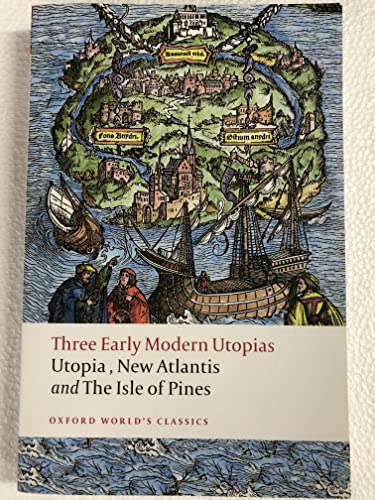


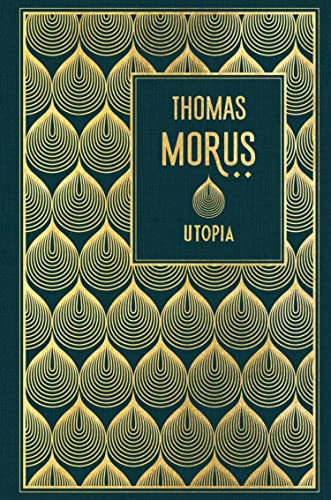
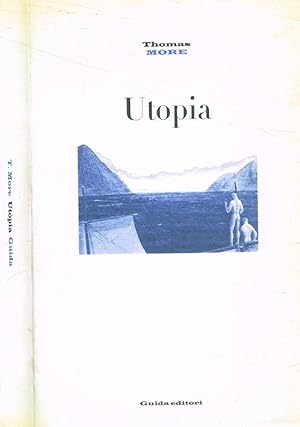
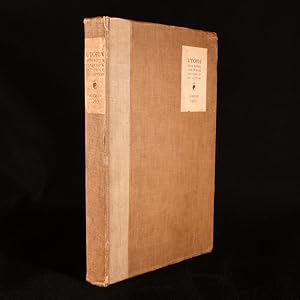
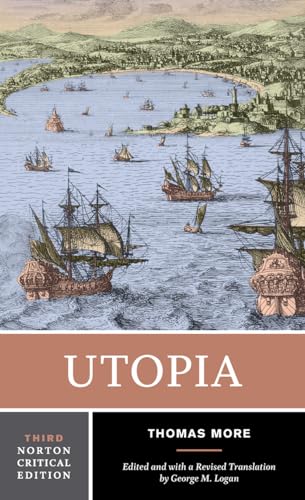
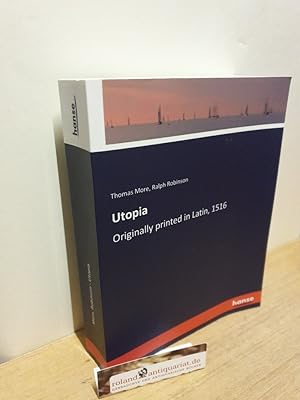
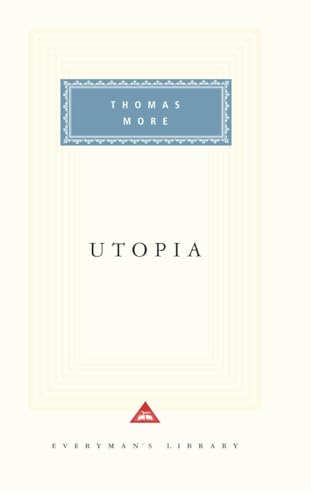
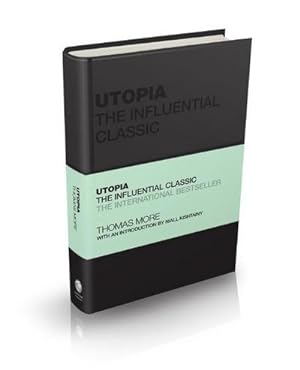
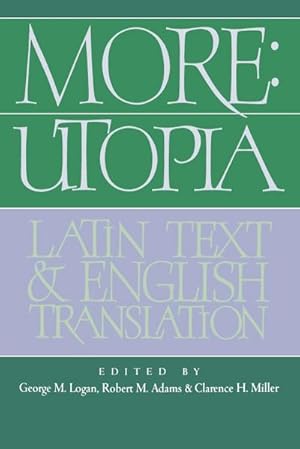
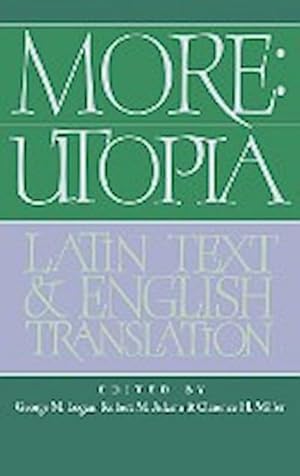

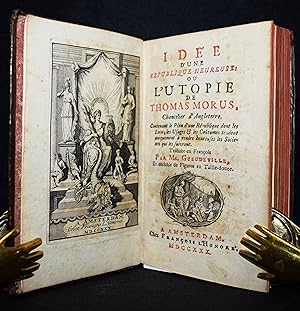
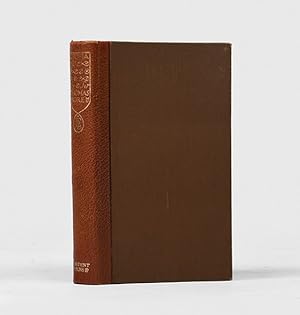
![Bild des Verkäufers für [Utopia] De optimo reip. statu, deque nova insula Utopia, libellus vere aureus zum Verkauf von Heritage Book Shop, ABAA](https://pictures.abebooks.com/inventory/md/md30043665346.jpg)
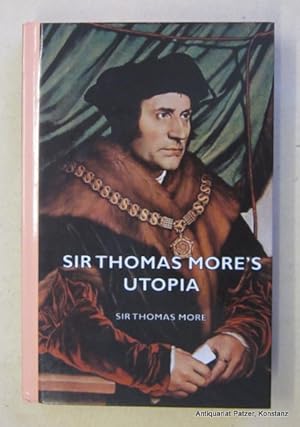
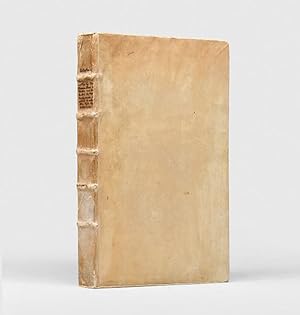
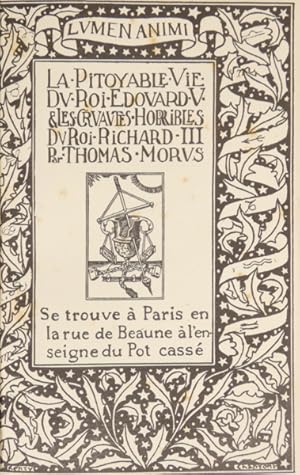
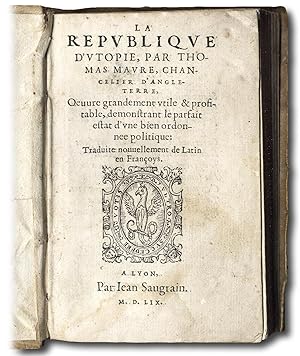
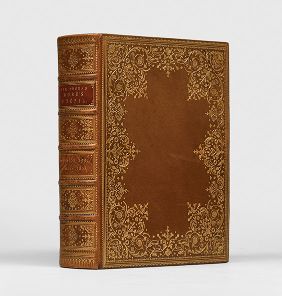
![Bild des Verkäufers für Omnia [ ] Latina Opera. [with] A dyaloge of syr Thomas More knyght. zum Verkauf von Sokol Books Ltd. ABA ILAB](https://pictures.abebooks.com/inventory/md/md31598421102.jpg)
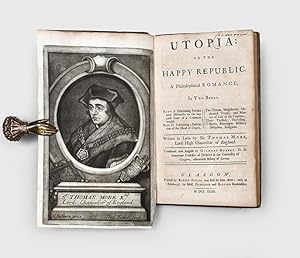
![Bild des Verkäufers für De optimo Reipublicae statu, deque nova insula Utopia, libri duo. [and], Moriae Enkomion: Stultitiae laudatio zum Verkauf von Hordern House Rare Books](https://pictures.abebooks.com/inventory/md/md13245438814.jpg)


